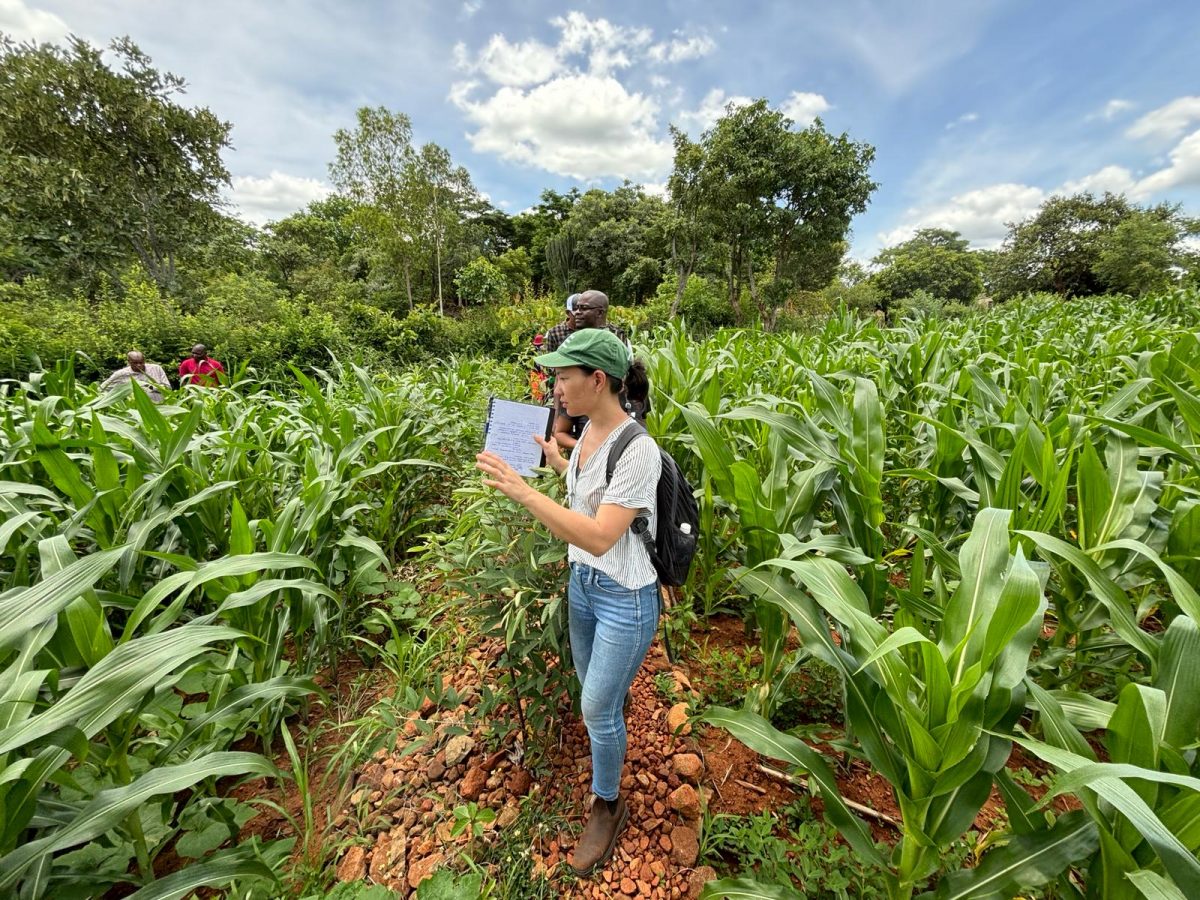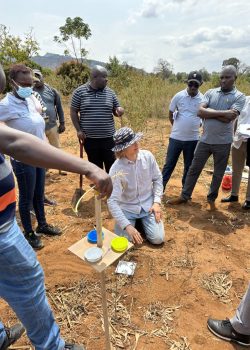
Michelle Carkner works with partners to collect data in the Chimanimani region of Zimbabwe. On the left are squash plants intercropped with maize and on the right, groundnut is intercropped with maize. Michelle is standing on a berm created by the farmer to slow water movement during rainfall events for water conservation and to reduce erosion.. Photo: Sasha Loewen
World Food Day 2024: UM researchers tackle global food security and chronic disease challenges
World Food Day, celebrated annually on October 16, highlights the crucial issue of global food security. This day, which marks the founding of the United Nations Food and Agriculture Organization, serves to raise awareness about hunger and poverty worldwide while inspiring action to ensure everyone has access to sufficient, safe, and nutritious food. It calls for innovative solutions to address food insecurity, promote sustainable agricultural practices, and envision a future where no one goes hungry.
The University of Manitoba has made food security a key strategic research focus, particularly within the Faculty of Agricultural and Food Sciences. Researchers here are working to create healthy communities and promote environmental sustainability, from both a local and global perspective.
Improving life for chronic kidney disease patients
Dylan MacKay, assistant professor in the Department of Food and Human Nutritional Sciences, studies nutritional interventions and chronic diseases, in particular chronic kidney disease (CKD).
Approximately 1 in 10 Canadians have CKD, and as kidney function gets reduced, some people with CKD can end up with high levels of potassium in their blood. Because of this, they are told to reduce their potassium intake, but potassium is found in healthy foods like fruit and vegetables.

Dylan Mackay
“Dietary restrictions are difficult to manage and lead to decreased overall quality of diet. CKD is an incredibly costly condition, both personally for the people with the condition and their families, and for society, so improving the outcomes for people with CKD is important for everyone,” said MacKay.
MacKay and his team are conducting a clinical trial where people with CKD are given either high potassium or low potassium fruit and vegetables to consume to see if this leads to measurable changes in their potassium levels in the blood. The trial is funded by the Kidney Foundation of Canada and is taking place at CKD clinics at Health Sciences Centre and Seven Oaks General Hospital. The fruit and vegetables for the trial are being supplied by FOODFARE grocery store, in a unique partnership that leverages the store’s expertise in fruit and vegetable purchasing and their existing grocery delivery services.
MacKay sees the potential for positive outcomes for their clinical trial intervention.
“If our research results demonstrate that the potassium in fruit and vegetables doesn’t really matter in terms of people with high potassium and CKD, then we will be working on changing the dietary guidelines for people with CKD, so that they can have more variety and less restriction in their lives,” said MacKay.
Supporting nature positive practices for improved farming
Michelle Carkner, research associate in the Department of Plant Science, and the Natural Systems Agriculture Research Group seek to redesign agricultural systems using ecological principals.
They are partners in a large project directed by the Canadian Food Grains Bank (CFGB) which is taking place across Ethiopia, Kenya, Zimbabwe and Mozambique. Here the goal is to rehabilitate damaged landscapes through nature positive practices including conservation agriculture, natural regeneration, water retention, and reforestation.

Andrew Enns shows how to set insect traps in Kenya (Photo: Sasha Loewen).
Carkner and her UM teammates Andrew Enns and Sasha Loewen have taken on the task of facilitating data collection to capture the impacts these interventions will have, which may lead to greater understanding of impacts on biodiversity, crop/plant productivity, soil health, water management, ecosystem services, and animal health. The tracking ranges from farm-level measurements to satellite tracking to pinpoint where practices are most effective.
Carkner and her colleagues have now visited the partner countries multiple times, and Enns, who is integrating his MSc project with the interventions in Kenya, is planning to return to that country in November. The project is ongoing until 2026.
Carkner notes that a critical element of this work is its participatory approach. The UM team wrote a data collection protocol document in consultation with the partner organizations, who will begin collecting data in their next planting seasons this fall and into the new year.
“We co-designed the research objectives by building relationships with CFGB staff and country partners and listen to what information farmers want to know from the interventions they are implementing on their land. Through this process, the project will not only create economic and environmental resiliency for communities in the partner countries, but also increase research and knowledge capacity of the communities and partners throughout the project,” said Carkner.






